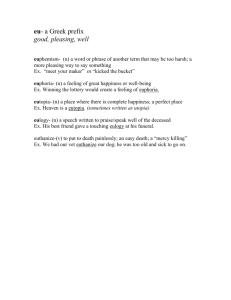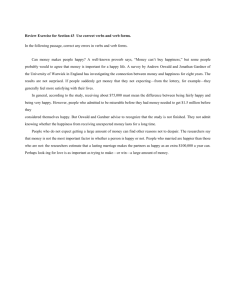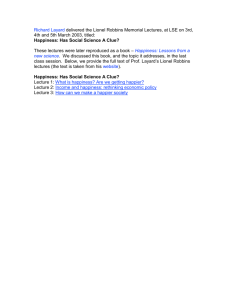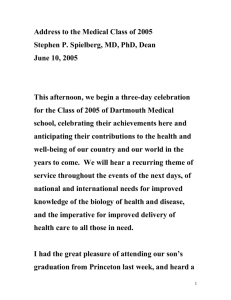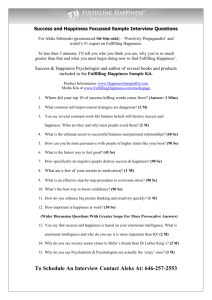Psych 201. The Science of Happiness
advertisement
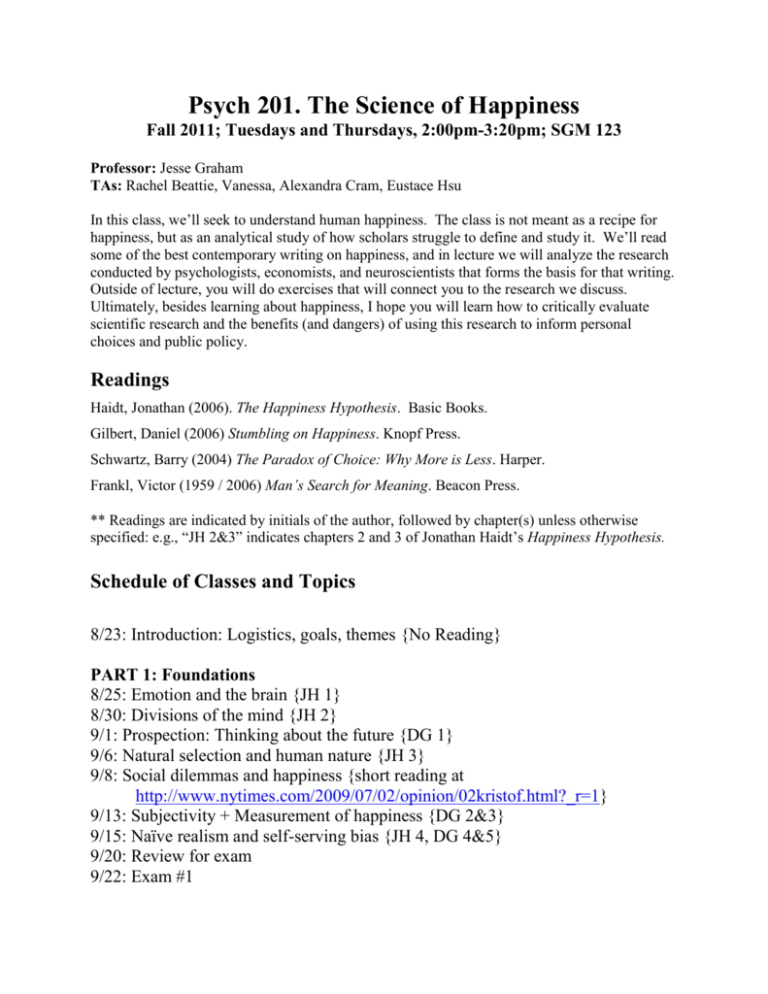
Psych 201. The Science of Happiness
Fall 2011; Tuesdays and Thursdays, 2:00pm-3:20pm; SGM 123
Professor: Jesse Graham
TAs: Rachel Beattie, Vanessa, Alexandra Cram, Eustace Hsu
In this class, we’ll seek to understand human happiness. The class is not meant as a recipe for
happiness, but as an analytical study of how scholars struggle to define and study it. We’ll read
some of the best contemporary writing on happiness, and in lecture we will analyze the research
conducted by psychologists, economists, and neuroscientists that forms the basis for that writing.
Outside of lecture, you will do exercises that will connect you to the research we discuss.
Ultimately, besides learning about happiness, I hope you will learn how to critically evaluate
scientific research and the benefits (and dangers) of using this research to inform personal
choices and public policy.
Readings
Haidt, Jonathan (2006). The Happiness Hypothesis. Basic Books.
Gilbert, Daniel (2006) Stumbling on Happiness. Knopf Press.
Schwartz, Barry (2004) The Paradox of Choice: Why More is Less. Harper.
Frankl, Victor (1959 / 2006) Man’s Search for Meaning. Beacon Press.
** Readings are indicated by initials of the author, followed by chapter(s) unless otherwise
specified: e.g., “JH 2&3” indicates chapters 2 and 3 of Jonathan Haidt’s Happiness Hypothesis.
Schedule of Classes and Topics
8/23: Introduction: Logistics, goals, themes {No Reading}
PART 1: Foundations
8/25: Emotion and the brain {JH 1}
8/30: Divisions of the mind {JH 2}
9/1: Prospection: Thinking about the future {DG 1}
9/6: Natural selection and human nature {JH 3}
9/8: Social dilemmas and happiness {short reading at
http://www.nytimes.com/2009/07/02/opinion/02kristof.html?_r=1}
9/13: Subjectivity + Measurement of happiness {DG 2&3}
9/15: Naïve realism and self-serving bias {JH 4, DG 4&5}
9/20: Review for exam
9/22: Exam #1
PART 2: Barriers to happiness
9/27: Heritability, Adaptation and Hedonic Treadmill {JH 5, up to page 90}
9/29: Money and happiness {No reading}
10/4: Cognitive failures: Barriers to getting what you want {BS 3}
10/6: Hedonic (mis)forecasting {DG 6, 7} **Skype Guest Star: Dan Gilbert**
10/11: Too much choice? {BS Prologue, BS 4}
10/13: Regrets, rumination, and social comparison {BS 6&7} **Skype Guest Star:
Barry Schwartz**
10/18: Clinical depression {Reading posted on Blackboard}
10/20: Weakness of will {Reading on Blackboard or at
http://www.newyorker.com/reporting/2009/05/18/090518fa_fact_lehrer?curr
entPage=all}
10/25: Review
10/27: Exam #2
PART 3: What makes people happy?
11/1: Optimism and CBT {Reading Posted – Peterson Chapter}
11/3: Happiness from within: Meditation & Mindfulness {JH 5, pp. 90-106}
11/8: Happiness from without: The value of work and play {No Reading}
11/10: Love and Attachments {JH 6&7} (Guest lecture by Sena Koleva)
11/15: Adversity, gratitude and meaning {JH 8 + VF Part I} **Skype Guest Star:
Jon Haidt**
11/17: Virtue and divinity: {JH 9 & 10}
11/22: What is Your Happiness Movie (Lisa Kamen to present) {VF Part II}
11/24: HOLIDAY – HAPPY THANKSGIVING
11/29: What should government do, if anything? {Sunstein & Thaler article posted
on Blackboard}
12/1: Review
Final Exam: Thursday, December 8, 2-4 p.m
Evaluation
There are four components to evaluation in this class:
1.
2.
3.
4.
Discussion Section Activities: 20%
Presentation/Debate: 5%
Three Exams: 60% (20% each exam)
Paper: 15%
Discussion Section Activities: The exercises that you will do in section are meant to connect
you, as an individual, to the research that we discuss. Most of these exercises will be done in
discussion section, and some of them may be done via the class website (go to the link labeled
Course Exercises). The books and lectures we will discuss in this course are based on research
similar to what you will do in the exercises. Our goal is to not just accept past research at face
value, but instead to evaluate it critically and only use it to inform our personal lives (and the
public policies we support) if we think it is sound.
Presentation and Debate: You will be assigned to a team of people in your discussion section
and assigned a debate position (on whether or not happiness can easily be changed). Your
team’s overall grade on the presentation and debate will be determined by your discussion
section TA. Members of the team will also evaluate each other and these team evaluations will
increase or decrease each person’s grade by up to one letter grade. So, for example, if your team
got a “B” and most of your team members rated you as a poor team member, you would get a
“C.” If you were rated as a great team member, you would get an “A.” And, if you are rated as
average, or have a mix of ratings, you would get a “B.”
If you do not show up for the presentation and debate, you will receive a ZERO, regardless
of your team’s grade and how they rate you.
Exams: The exams will be multiple choice and essay format (about 70% multiple choice, 30%
essay). The content of the exams will be drawn from the reading and the lecture material (mostly
on areas where the lecture and readings overlap).
Paper: The final paper is due the last day of class. We are looking for a concise essay on your
view of how happiness should be defined and the key conclusions to be drawn about how
individuals should structure their lives. Please reference your initial views on defining happiness
and how those views may have changed during the semester. If you wish, you can include an
argument about how nations and communities should structure their public policies to maximize
happiness (as you define it). But you don’t need to include this to write an “A” essay, so it is up
to you what you want to focus on.
Your essay will be graded on the strength of your argument, the amount of relevant evidence you
cite for your position, and the clarity and persuasiveness of your writing. The paper may not be
more than 1000 words. If your paper is 1001, we will only read the first thousand words, and
you will be penalized for not following directions. That might seem Draconian, but we want to
be able to read every paper carefully in the short time there is to get grades in.
Grading Philosophy and Structure: The grading in this class will use standard percent criteria,
listed below.
93% - 100%
90% - 92.9999%
87% - 89.9999%
83% - 86.9999%
80% - 82.9999%
77% - 79.9999%
A
AB+
B
BC+
73% - 76.9999%
70% - 72.9999%
67% - 69.9999%
63% - 66.9999%
60% - 62.9999%
Below 60%
C
CD+
D
DF
There may be a curve. After everything is graded, we will compute each student’s overall course
percentage and examine the grade distribution for the class. If the average grade (the median) is
below 83%, I will add points to everyone’s score to bring the average up to 83%. Thus, at a
minimum, half of the class will get a B or higher. If the class average is above 83%, I will not
curve down.
Other than the curve, I will not be rounding up anyone’s grade or applying any subjective criteria
to the grade cut-offs or to anyone’s grades. If you get a 79.9999%, that will be a C+, not a B-.
Extra Credit: There will be three opportunities for extra credit in this class. You are welcome to
do any combination of these you like (maximum of 7 extra percentage points possible, added
after any curving): 1. You have the opportunity to receive extra credit for participating in
research going on at USC. This will be done through the “Experimetrix” system, and someone
will make a presentation in class to explain the system. You will receive .5 extra percentage
points for each hour of extra credit, up to a maximum of 4 hours (2 points max). 2. You can
participate in the Project Happiness project, which is a several-week online study. This will be
explained in class in late September (2 points max). 3. You can participate in the Joint
Educational Project service learning organization, teaching K-12 students about the science of
happiness. Someone from the JEP program will explain this option in class; the contact person
for any JEP-related questions is Anna Lindtjorn <jep.anna@gmail.com> (3 points max).
Illness, Vacations, etc. If you are seriously ill, you must keep me and your discussion section
TA informed of your emergency and provide documentation so that we can contact your doctor
to verify your illness. Likewise, if you have a death in your family and must miss an exam
because of this, inform us immediately and on your return provide us with documentation so that
we can verify the validity of your absence.
If you are an athlete and will miss class because of a race, match, meet, or game you must inform
me of that at the start of the semester. Likewise, if you must travel for another reason (academic
conference, family wedding, etc.), you must inform me of that at the start of the semester. There
will be no make-up exams for missed exams for reasons other than illness or death in the family
if I am not informed of the date of the absence in the first two weeks of classes.
The date of the final is set by the Registrar and I may not change a student’s final date/time
except for the reasons set out by the Registrar.
Other Issues
Attendance. I hope you will regularly come to lecture. However, I won’t be taking attendance.
If you come late to class, try to be as quiet as possible when entering the room. Slides will be
posted on Blackboard after each class, but as these will not contain all the material covered in
lecture it is in your interest to attend regularly.
Attendance at discussion section is mandatory and counts towards roughly half of your
Discussion Section Activities grade. Please do not ask your TA to make an exception for you.
Your TA will be in serious trouble with me if he or she does, so don’t ask. If you have a
legitimate reason for missing discussion (illness, death in the family), contact me and we will
work it out.
Reaching me: The best way to contact me is via email (jesse.graham@usc.edu) I do not check
phone messages left at my campus number when I am away from campus. When emailing me,
please put Psych-201 in the subject line – I will be more likely to read your email immediately if
I know it is about our class.
DSP: Students requesting academic accommodations based on a disability are required to
register with Disability Services and Programs (DSP) each semester. A letter of verification for
approved accommodations can be obtained from DSP when adequate documentation is filed.
Please be sure the letter is delivered to me (or to your TA) as early in the semester as possible.
DSP is open Monday-Friday, 8:30-5:00. The office is in the Student Union 301 and their phone
is (213) 740-0776.
Academic integrity: Students should be familiar with university policies regarding academic
honesty. Failure to adhere to these policies will result in an F for the course and the matter will
be forwarded to the Office of Student Judicial Affaires for possible further action. We will be
using “Turn it in” to detect plagiarism (including self-plagiarism of turning in work done
for other classes). For more info about grading policies and procedures, including policies
covering cheating and plagiarism, see
http://www.usc.edu/dept/ARR/private/forms/Handbooks/Grade_Handbook_rev042010.pdf .
Office Hours and Contact Information
Jesse Graham
Rachel Beattie
Vanessa
Alexandra Cram
Eustace Hsu
SGM 804: Tuesdays 10-12
SGM 718: T 11-12, Th 12-1
HNB B28: Mondays 2-4
SGM 625: Tue 10:30-12:30
HNB 115: Thursdays 11-1
jesse.graham@usc.edu
rachel.beattie@gmail.com
vanessa.jmc@gmail.com
acram@usc.edu
eustaceh@usc.edu
Section Times, Locations, and TAs
52421
52422
52423
52424
52425
52426
52427
52428
52429
52430
52431
52432
M 8:00am - 9:50am
M 8:00am - 9:50am
Th 8:00am - 9:50am
Th 8:00am - 9:50am
M 10:00am - 11:50am
M 10:00am - 11:50am
F 10:00am - 11:50am
F 10:00am - 11:50am
M 12:00pm - 1:50pm
M 12:00pm - 1:50pm
F 2:00pm - 3:50pm
F 2:00pm - 3:50pm
KAP 137
KAP 138
THH 118
KAP 138
VHE 214
KAP 166
VHE 214
KAP 166
THH 106
THH 121
VHE 214
VHE 210
Alexandra Cram
Vanessa
Alexandra Cram
Eustace Hsu
Rachel Beattie
Vanessa
Rachel Beattie
Eustace Hsu
Vanessa
Eustace Hsu
Rachel Beattie
Alexandra Cram
Section Schedule
Week of 8/22 – No section.
Week of 8/29 – Prisoner's Dilemma lab + Happiness discussion. This lab will be
some introductory discussion.
Week of 9/5 – No section.
Week of 9/12 – Measurement section.
Week of 9/19 – OPTIONAL review session. Students in Thursday and Friday sections are
welcome to attend a Monday, Tuesday or Wednesday section.
Week of 9/26 – Gender differences and gender trends in happiness.
Week of 10/3 – No section.
Week of 10/10 – Maximizing vs satisficing lab. Schwartz video.
Week of 10/17 – Self-control/ behavioral change lab.
Week of 10/24 – OPTIONAL review session. Students in Thursday and Friday sections are
welcome to attend a Monday, Tuesday or Wednesday section.
Week of 10/31 – Mindfulness meditation lab.
Week of 11/7 – No section.
Week of 11/14 – Morality and happiness lab.
Week of 11/21 – No section; meet with your group for debate prep.
Week of 11/28 – Debate.
Additional readings that might be of interest (not required!)
How Pleasure Works by Paul Bloom (Very entertaining and provocative take on human pleasure
– and how it’s so much weirder than animal pleasure – by a developmental psychologist)
Happiness, A History by Darrin McMahon (Philosopher’s synthesis of the diverse ways
happiness has been conceptualized in Western civilization)
The How of Happiness by Sonja Lyubomirsky (Practical guide to application of psychology
research to improve your happiness)
Breakdown of Will by George Ainslie (Expansive theory of motivation emphasizing temptation
and willpower)
Passions within Reason by Robert Frank (Prominent behavioral economist considers the
evolutionary basis of irrationality)
Authentic Happiness and Flourish by Martin Seligman (Popular research-based guides to
happiness interventions from the founder of positive psychology)
Flow and Finding Flow by Mihaly Csikszentmihalyi (Practical guide to the joys of losing oneself
in a task, from the other founder of positive psychology)





